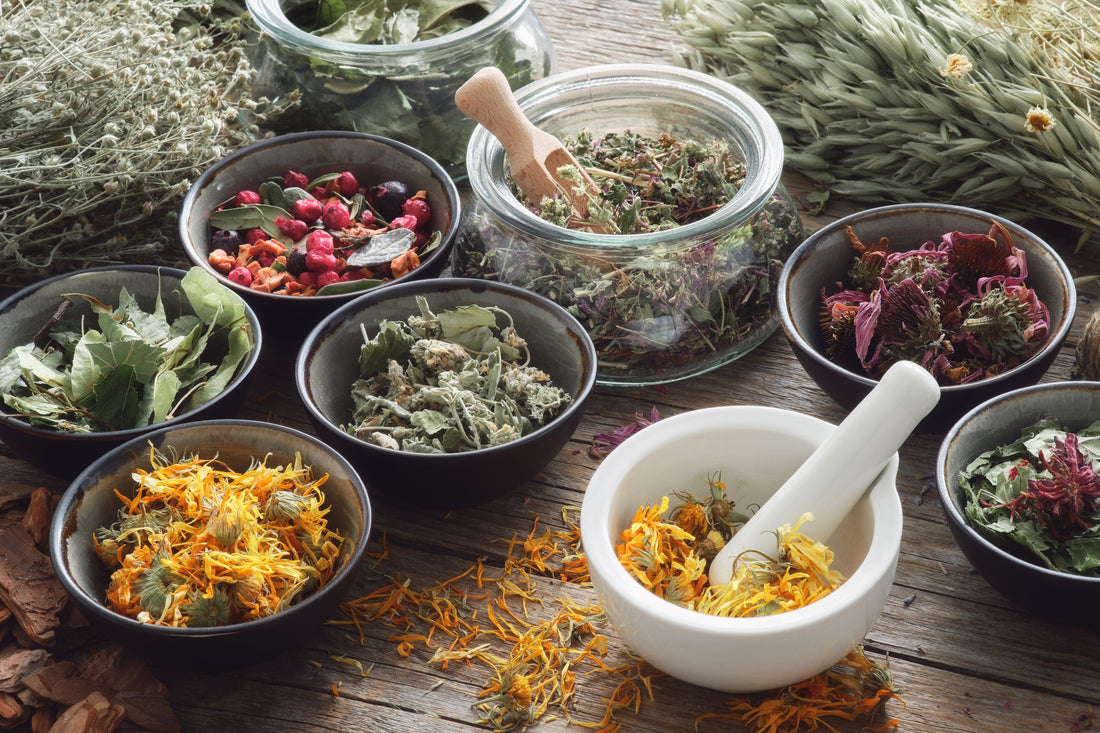When life gives you bumps, bites, and bellyaches, nature has a remedy ready. In this week’s blog, we’re diving into the empowering world of Herbal First Aid—a gentle, effective way to care for minor wounds, burns, bites, and digestive upsets using simple, natural ingredients. Whether you’re at home or on the go, these time-tested plant allies can be your first line of defence.
Nature’s Medicine Cabinet
Let’s take a look at a few key herbs you can start using today:
Calendula (Calendula officinalis) – The Skin Soother
Calendula is a vibrant flower known for its anti-inflammatory and antimicrobial properties. It's perfect for cuts, scrapes, minor burns, and skin irritations.
DIY Calendula Salve:
- Infuse dried calendula flowers in olive oil for 2–4 weeks (or use a gentle double boiler method for a quicker infusion).
- Strain and mix the oil with beeswax (about 1 oz per cup of oil) until melted.
- Pour into small tins or jars. Cool, label, and store in a cool, dark place.
This golden salve is gentle enough for kids and can even double as a lip balm or diaper rash cream.
Yarrow (Achillea millefolium) – The Wound Warrior
Yarrow is a powerful styptic—it helps stop bleeding fast—and has antiseptic properties.
How to Use: Yarrow Poultice
- Crush fresh yarrow leaves (or rehydrate dried ones).
- Apply directly to minor cuts or scrapes to help stop bleeding and prevent infection.
- Wrap with gauze if needed and replace every few hours.
Chamomile (Matricaria chamomilla) – The Calming Comforter
Chamomile is famous for its calming effects, but it’s also great for reducing inflammation and easing eye or skin irritations.
Chamomile Compress:
- Brew a strong chamomile tea using 2–3 tea bags or 1 tablespoon of dried flowers.
- Let it cool slightly, soak a clean cloth in the tea, and apply as a compress to puffy eyes, minor burns, or upset tummies.
Bonus: Drink a cup to soothe digestive upset or anxiety.
Plantain (Plantago major/lanceolata) – The Drawing Herb
Great for: Insect bites, stings, splinters
Plantain helps draw out toxins and soothe irritation.
Quick Use Tip: Chew a clean fresh leaf into a paste and apply directly to a sting or bite. Wrap with a bandage and let sit for 30–60 minutes.
Lavender (Lavandula angustifolia) – Gentle Disinfectant & Calm in a Bottle
Great for: Burns, anxiety, bug bites
Lavender essential oil is antimicrobial, soothing to skin, and calming to the nervous system.
Use Tip: Add a few drops of lavender essential oil to a carrier oil (like coconut or olive oil) and apply to burns or bites. A few drops on a tissue can ease travel stress or headaches.
Building Your Herbal Travel Kit
Stay prepared on your next adventure with a compact herbal first aid kit. Consider including:
- Calendula salve (for wounds and skin)
- Yarrow tincture or dried leaves (for bleeding)
- Chamomile tea bags (for calming and digestive support)
- Lavender essential oil (antiseptic, calming)
-
Plantain leaf (anti-itch and drawing agent for bites/stings)
Safety First: When to Seek Medical Help
Herbal first aid is fantastic for minor issues, but know when to go to a professional:
- Deep or infected wounds
- Severe allergic reactions
- High fevers or persistent digestive issues
-
Burns larger than a few inches or that blister deeply
Use herbs as complementary support—not a replacement for critical care.
Using herbs for first aid is about more than just remedies—it's about reconnecting with the rhythms of nature and taking charge of your well-being. These humble plants offer powerful support when we learn to work with them respectfully and wisely.
Take a moment this week to stock your herbal shelf, make a salve, or craft a poultice. Empower yourself with the ancient, natural wisdom of the green world around you.

